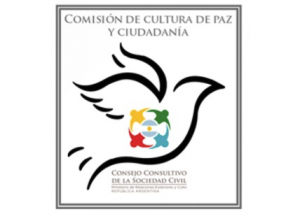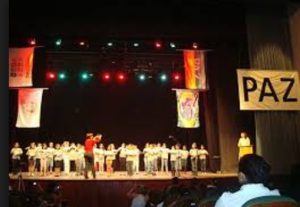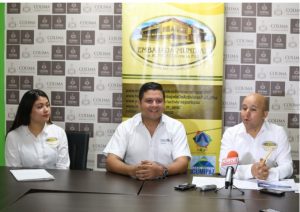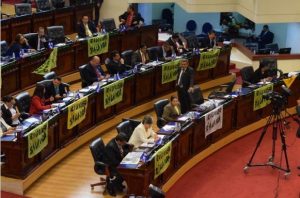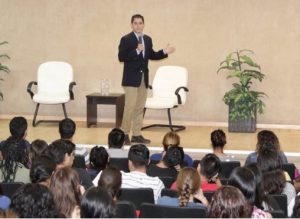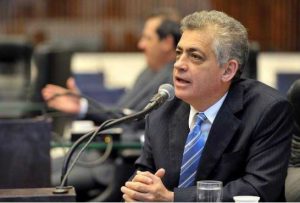FREE FLOW OF INFORMATION
An article by Hernán Camacho in Seminar Voz
More than 300 organizations in 18 departments signed on to the National Pact for Life and Peace.
It was more than just a peace initiative. The National Peace Congress, held between 27 and 29 April, became a mobilizer of a vision that can ead us along the path towards a stable and lasting peace. The expectations of the social organizations that convened the Congress were fulfilled, the agenda of new mobilizations and peace initiatives is already being confirmed, and most importantly, those attending the Congress signed the National Pact for Life and Peace.
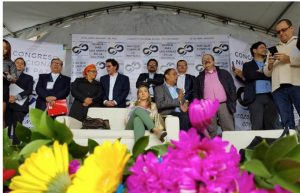
Closing of the National Congress of Peace in the Place of Bolivar in Bogota.
Photo NC News.
(Click on photo to enlarge)
It was more than just a peace initiative. The National Peace Congress, held between 27 and 29 April, became a mobilizer of a vision that can ead us along the path towards a stable and lasting peace. The expectations of the social organizations that convened the Congress were fulfilled, the agenda of new mobilizations and peace initiatives is already being confirmed, and most importantly, those attending the Congress signed the National Pact for Life and Peace.
This pact is a commitment that describes the current reality of the implementation process of the Havana agreement, and the peace process in Quito with the ELN. But it also draws on what is happening today in the territories where there are conflict scenarios, Transition Areas of Normalization and in the territories where the Farc was present. A Pact for Life calls us to take the weapons out of national political life and to promote reconciliation among Colombians.
Difficulties
This was said in Bogota by the secretary general of the Colombian Communist Party, Jaime Caycedo, who attended the regional peace congress that was held at the Minuto de Dios University, on Friday, April 28: “Taking the weapons out of politics involves not just the insurgency, but those sectors that are based on paramilitarism and maintain a war against the forces of the left that propose an alternative to a corrupt and patronizing country, “said Caycedo.
And the concern, which the participants of the initiative mostly pointed out in the regional meetings, refers to the increase of the paramilitary presence in each one of the departments of the country. The main concern is in Chocó, Antioquia, Cesar, Meta, Caqueta, among others. Testimonies such as those of settlers in Cacarica and Urabá Antioquia, warn that there are paramilitary forces present with the approval of official troops. “The Army is paralyzed.”
Timing of renegotiation
But paramilitarism was not the only topic of discussion in the long days. For Senator Iván Cepeda of the Democratic Pole, the Peace Congress should mean a boost to the implementation process and attention to lost time and putting legislative initiatives on the fast track.
“The processes of renegotiation of the agreements need to be finished and that the legislative process for integral agrarian development should be initiated immediately,” said Cepeda, who invited the candidates and candidates for the Presidency of the Republic to Respect and commit to the signed peace accords.
The United Nations, represented by its resident Martin Santiago Herrero, said that his presence at the Peace Congress is a sign of the will of the international community to accompany each of the initiatives that contribute to the realization of peace.
(Article continued in right column)
(Click here for the original Spanish version of this article
Question related to this article:
What is happening in Colombia, Is peace possible?
(Article continued from left column)
“Peace is an opportunity for transformation and change in those regions that have suffered from the conflict. But experience also shows that the first 18 to 24 months are the most important in the implementation of the agreements. All efforts are necessary, “said Santiago.
The UN is concerned about three worrisome issues to consolidate peace. On the one hand, to safeguard the lives of human rights defenders and some cases of death to ex-combatants of the FARC and their families; On the other hand, the presence of criminal successor groups of the paramilitaries, and the need to advance the peace process with the ELN.
The intervention of Roberto Menéndez, Head of the Mission to Support the Peace Process in Colombia of the OAS, was in the same vein. “The Peace Congress motivates the efforts made by the national government, insurgencies, communities, women, indigenous peoples, Afro peoples, workers and the people in generating them out of the tragedy of the conflict. But we must recognize that the Congress that boasts of having different visions of peace, “said Menendez.
Regional peace
For Green party leader Ángela María Robledo, the Peace Congress revealed that peace has a regional focus: “We are here to continue to accompany implementation and give unconditional support to the ELN peace talks. We have to take the weapons out of politics, we must strengthen the rule of law and we must focus on peace in the regions to transform the lives of the Colombians of the deep Colombia, “said Robledo.
The guerrilla commander Iván Márquez made an appearance and expressed his gratitude for the invitation to the FARC-EP. From the rostrum he noted: “The peace agreement of November 24 signed at the Teatro Colon, are more than 310 pages. It is the birth certificate of a transforming power that in the hands of the people and statesmen with vision, can be used to fill our homeland with humanity, inclusion, respect for the other and social justice. It is urgent to activate the great national political agreement mentioned in the introduction of the agreement that defines the reforms and institutional adjustments to address the challenges that peace demands by imposing a new framework of social coexistence, “said Márquez.
The fulfillment of the agreement that Iván Márquez demands, was reiterated by Commander Victoria Sandino, who denounced the lack of advances in the process of implementation of the agreements in the Congress and in the Transitional Areas of Normalization. “We are building a conflictive peace, starting with the situations of the paramilitary phenomenon unleashed throughout the national territory. They are killing the comrades and relatives. Peace can not be possible in the midst of death, “said Sandino.
Government
Another of the attendees was the ex-mayor of Bogotá Rafael Pardo, who noted that the next step in the implementation process will be the ambitious economic plan that should establish agricultural points to replace illicit crops. “May is the key month for implementation. These are major challenges, as the FARC must finish the arms embargo and the Government must present the Framework Implementation Plan, which has to do with points one and four for the next 15 years. This framework will regulate local and national development plans for the next three five-year periods and how they are to be executed. For this, it will be the Council for Economic and Social Policy who will set the budgetary frameworks for the agreements, “said Rafael Pardo who is now serving as post-conflict minister.
At the end of the day the conversation turned to the question: How is the process going with the ELN? The participants were Alberto Castilla as moderator, Juan Camilo Restrepo, chief negotiator of the Colombian government in Quito and guerrilla chief Eduardo Martínez, of the ELN. They stressed the importance of the participation of local communities because they are the ones that today suffer the war. “We will continue at the table, ready to advance in the path of difficulties, but with everyone involved,” said Eduardo Martinez.
